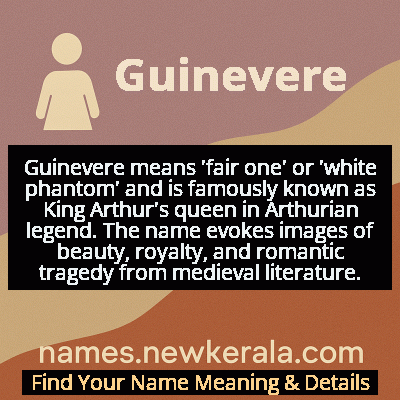Guinevere Name Meaning & Details
Origin, Popularity, Numerology Analysis & Name Meaning of Guinevere
Discover the origin, meaning, and cultural significance of the name GUINEVERE. Delve into its historical roots and explore the lasting impact it has had on communities and traditions.
Name
Guinevere
Gender
Female
Origin
Arthurian
Lucky Number
7
Meaning of the Name - Guinevere
Guinevere means 'fair one' or 'white phantom' and is famously known as King Arthur's queen in Arthurian legend. The name evokes images of beauty, royalty, and romantic tragedy from medieval literature.
Guinevere - Complete Numerology Analysis
Your Numerology Number
Based on Pythagorean Numerology System
Ruling Planet
Neptune (Ketu)
Positive Nature
Intuitive, analytical, spiritual, and inquisitive.
Negative Traits
Secretive, reserved, aloof, and can be overly critical.
Lucky Colours
Green, yellow.
Lucky Days
Monday.
Lucky Stones
Cat’s eye, moonstone.
Harmony Numbers
1, 5, 6.
Best Suited Professions
Scientists, researchers, spiritual leaders, detectives.
What People Like About You
Depth of knowledge, analytical skills, spirituality.
Famous People Named Guinevere
Guinevere Turner
Actress and screenwriter
Known for roles in 'The L Word' and writing for American Psycho
Guinevere van Seenus
Fashion model
Prominent model featured in Vogue and other major fashion publications
Guinevere of Camelot
Mythological queen
Legendary queen of King Arthur, central figure in Arthurian romance
Name Variations & International Equivalents
Click on blue names to explore their detailed meanings. Gray names with will be available soon.
Cultural & Historical Significance
Throughout literary history, interpretations of Guinevere have ranged from tragic victim to powerful agent of her own destiny, reflecting changing attitudes toward women's roles and sexuality across different eras. In modern retellings, she has been reimagined as a more complex and empowered figure, often highlighting her intelligence, political acumen, and personal agency beyond her romantic entanglements. The enduring fascination with Guinevere speaks to her role as a mirror for societal values about women, power, love, and morality throughout Western cultural history.
Extended Personality Analysis
Individuals named Guinevere are often perceived as possessing a regal and elegant demeanor, combined with deep emotional complexity. They typically exhibit strong leadership qualities, artistic sensitivity, and a natural grace that commands respect. The name suggests someone who is both intellectually sharp and emotionally intuitive, capable of great loyalty but also possessing a passionate nature that can lead to internal conflicts between duty and desire. These individuals often display remarkable resilience in facing challenges, drawing strength from their convictions while maintaining a certain mystique that intrigues others.
Their personality tends to blend traditional values with modern independence, creating a compelling balance of strength and vulnerability that makes them memorable and influential figures in their social circles. Guineveres are often drawn to creative pursuits, leadership roles, or fields requiring both analytical thinking and emotional intelligence. They may struggle with the expectations others place on them due to the name's royal and legendary associations, but this pressure often forges individuals of exceptional character and depth. The name carries an expectation of sophistication and complexity that most bearers seem to naturally embody.
Modern Usage & Popularity
In contemporary times, Guinevere has experienced a resurgence as parents seek unique yet historically significant names with literary and mythological connections. While not among the most popular names, it maintains a steady presence, particularly among families with interests in Arthurian legend, Celtic heritage, or seeking names with strong female associations. The name appeals to modern parents looking for alternatives to more common names like Jennifer (which derives from Guinevere) while maintaining a classic, elegant sound. Its usage has been bolstered by the trend toward mythological and literary names, and it often appears in creative circles and among families valuing historical depth in name selection. The diminutives Gwen and Gwenny have gained more widespread popularity, making the full Guinevere feel both distinctive and accessible while allowing for casual everyday use.
Symbolic & Spiritual Meanings
Guinevere symbolizes the eternal tension between love and duty, personal desire and public responsibility. The name carries connotations of beauty, royalty, and tragic romance, representing feminine power in both its constructive and destructive aspects. Symbolically, Guinevere embodies the concept of the idealized queen whose human flaws ultimately lead to the downfall of a perfect society, making her a metaphor for the imperfection inherent in even the most noble aspirations. She represents the transformative power of love and its capacity to both create and destroy, serving as a cautionary figure about the consequences of passion unchecked by wisdom. The name also symbolizes resilience and redemption, as many modern interpretations emphasize her strength, intelligence, and ultimate survival beyond the Arthurian tragedy, transforming her from mere tragic figure to complex survivor.

